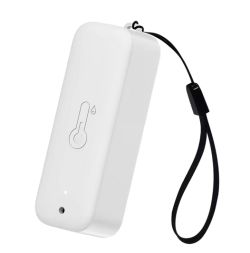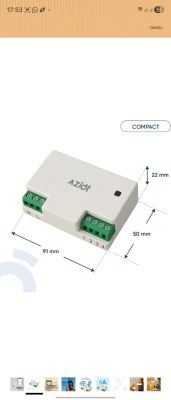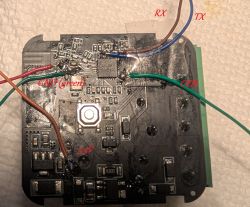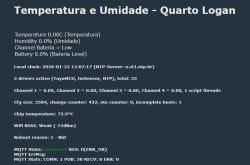still only those IDs
Code: JSON
Czy wolisz polską wersję strony elektroda?
Nie, dziękuję Przekieruj mnie tam



V:BK7231N_1.0.1
REG:cpsr spsr r13 r14
SVC:000000D3 00401C1C 000033AC
IRQ:000000d2 00000010 00401e0c eee356f7
FIR:000000d1 00000010 00401ffc f9c5abad
SYS:000000df 0040192c 00000158
ST:00000000
J 0x10000
bk_misc_init_start_type 0 0
prvHeapInit-start addr:0x4144f0, size:113424
[Flash]id:0xeb6015
sctrl_sta_ps_init
cset:0 0 0 0
OpenBK7231N, version 1.18.176
Entering initLog()...
Commands registered!
initLog() done!
Info:MAIN:Main_Init_Before_Delay
undefined instruction
Current regs:
r00:0xdd3000e2
r01:0x00000000
r02:0x005dd352
r03:0x00000052
r04:0x005dd300
r05:0xffbf767f
r06:0x003ff1ce
r07:0xdd300000
r08:0x08080808
r09:0x09090909
r10:0x10101010
fp :0x11111111
ip :0xffe38350
sp :0x00406070
lr :0x0080006e
pc :0x0080006e
SPSR:0x800000ff
CPSR:0x800000db
separate regs:
SYS:cpsr r8-r14
0x800000df
0x08080808
0x09090909
0x10101010
0x11111111
0xffe38350
0x00415618
0x003ff1b7
IRQ:cpsr spsr r8-r14
0x800000d2
0x6000001f
0x08080808
0x09090909
0x10101010
0x11111111
0xffe38350
0x004078a8
0x003ffd70
FIR:cpsr spsr r8-r14
0x800000d1
0x00000010
0x00000000
0x00000000
0x00000000
0x00000000
0x00000000
0x004068b8
0xf9c5abad
ABT:cpsr spsr r8-r14
0x800000d7
0x00000010
0x08080808
0x09090909
0x10101010
0x11111111
0xffe38350
0x004060b8
0x9980fef0
UND:cpsr spsr r8-r14
0x800000db
0x800000ff
0x08080808
0x09090909
0x10101010
0x11111111
0xffe38350
0x00406068
0x0080006e
SVC:cpsr spsr r8-r14
0x800000d3
0x200000df
0x08080808
0x09090909
0x10101010
0x11111111
0xffe38350
0x00408078
0x0008b360
shutdown...fjcns wrote:In my case, it wasn't necessary to desolder the MCU pins.
.....
[Flash]id:0xeb6015
sctrl_sta_ps_init
cset:0 0 0 0
OpenBK7231N, version 1.18.206
Entering initLog()...
Commands registered!
initLog() done!
Info:MAIN:Main_Init_Before_Delay
<hangs here>
#define DISABLE_FLASH_VARS_VARSclearIO
PowerSave 1
startDriver NTP
// ntp_setServer pool.ntp.org
ntp_setServer 192.168.40.1
// EEST time zone
alias winter_time ntp_timeZoneOfs 2
alias summer_time ntp_timeZoneOfs 3
winter_time
// summertime
alias check1 if $month>3 then summer_time
alias check2 if $month==3&&31-$mday+$day<=6&&$day>0 then summer_time
alias check3 if $month==3&&31-$mday+$day<=6&&$day=0&&$hour>=2 then summer_time
// wintertime
alias check4 if $month>10 then winter_time
alias check5 if $month==10&&31-$mday+$day<=6&&$day>0 then winter_time
alias check6 if $month==10&&31-$mday+$day<=6&&$day=0&&$hour>=3 then winter_time
alias set_time backlog check1;check2;check3;check4;check5;check6
startDriver TuyaMCU
startDriver tmSensor
setChannelType 1 temperature_div10
linkTuyaMCUOutputToChannel 1 val 1
setChannelType 2 Humidity
linkTuyaMCUOutputToChannel 2 val 2
setChannelType 3 ReadOnlyLowMidHigh
setChannelLabel 3 "Batt_state"
linkTuyaMCUOutputToChannel 3 val 3
waitfor NTPState 1
set_timeclearIO
PowerSave 1
startDriver NTP
ntp_setServer 192.168.1.1
// EDT-EST time zone
alias winter_time ntp_timeZoneOfs -5
alias summer_time ntp_timeZoneOfs -4
winter_time
// summertime
alias check1 if $month>3 then summer_time
alias check2 if $month==3&&31-$mday+$day<=6&&$day>0 then summer_time
alias check3 if $month==3&&31-$mday+$day<=6&&$day=0&&$hour>=2 then summer_time
// wintertime
alias check4 if $month>10 then winter_time
alias check5 if $month==10&&31-$mday+$day<=6&&$day>0 then winter_time
alias check6 if $month==10&&31-$mday+$day<=6&&$day=0&&$hour>=3 then winter_time
alias set_time backlog check1;check2;check3;check4;check5;check6
startDriver TuyaMCU
delay_s 2
uartSendHex 55AA001000070101090400010026
startDriver tmSensor
setChannelType 1 temperature_div10
linkTuyaMCUOutputToChannel 1 val 1
setChannelType 2 Humidity
linkTuyaMCUOutputToChannel 2 val 2
setChannelType 3 ReadOnlyLowMidHigh
setChannelLabel 3 "Batt_state"
linkTuyaMCUOutputToChannel 3 val 3
waitfor NTPState 1
set_time
// now wait for MQTT
waitFor MQTTState 1
// now wait for channel 1 to become non zero
// if channel 1 is still 0, loop, wait 0.1s and check again
again:
delay_s 0.1
if $CH1==0 then goto again
publish DATA {"ROOM":"1","TEMPERATURE":$CH1,"HUMIDITY":$CH2}Info:TuyaMCU:Consumed 20 unwanted non-header byte in Tuya MCU buffer
Info:TuyaMCU:Skipped data (part) 00 00 00 00 00 00 00 00 00 00 00 00 00 00 00 00 00 00 00 00
Info:TuyaMCU:Consumed 20 unwanted non-header byte in Tuya MCU buffer
Info:TuyaMCU:Skipped data (part) 00 00 00 00 00 00 00 00 00 00 00 00 00 00 00 00 00 00 00 00
Info:TuyaMCU:Consumed 40 unwanted non-header byte in Tuya MCU buffer
Info:TuyaMCU:Skipped data (part) 00 00 00 00 00 00 00 00 00 00 00 00 00 00 00 00 00 00 00 00 00 00 00 00 00 00 00 00 00 00 00 00 00 00 00 00 00 00 00 00
Info:TuyaMCU:Consumed 20 unwanted non-header byte in Tuya MCU buffer
Info:TuyaMCU:Skipped data (part) 00 00 00 00 00 00 00 00 00 00 00 00 00 00 00 00 00 00 00 00
Info:TuyaMCU:Consumed 20 unwanted non-header byte in Tuya MCU buffer
Info:TuyaMCU:Skipped data (part) 00 00 00 00 00 00 00 00 00 00 00 00 00 00 00 00 00 00 00 00
Info:TuyaMCU:Consumed 20 unwanted non-header byte in Tuya MCU buffer
Info:TuyaMCU:Skipped data (part) 00 00 00 00 00 00 00 00 00 00 00 00 00 00 00 00 00 00 00 00
Info:TuyaMCU:Consumed 20 unwanted non-header byte in Tuya MCU buffer
Info:TuyaMCU:Skipped data (part) 00 00 00 00 00 00 00 00 00 00 00 00 00 00 00 00 00 00 00 00
Info:TuyaMCU:Consumed 20 unwanted non-header byte in Tuya MCU buffer
Info:TuyaMCU:Skipped data (part) 00 00 00 00 00 00 00 00 00 00 00 00 00 00 00 00 00 00 00 00
Info:TuyaMCU:Consumed 40 unwanted non-header byte in Tuya MCU buffer
Info:TuyaMCU:Skipped data (part) 00 00 00 00 00 00 00 00 00 00 00 00 00 00 00 00 00 00 00 00 00 00 00 00 00 00 00 00 00 00 00 00 00 00 00 00 00 00 00 00
Info:TuyaMCU:Consumed 20 unwanted non-header byte in Tuya MCU buffer
Info:TuyaMCU:Skipped data (part) 00 00 00 00 00 00 00 00 00 00 00 00 00 00 00 00 00 00 00 00
Info:TuyaMCU:Consumed 20 unwanted non-header byte in Tuya MCU buffer
Info:TuyaMCU:Skipped data (part) 00 00 00 00 00 00 00 00 00 00 00 00 00 00 00 00 00 00 00 00
Info:TuyaMCU:Consumed 20 unwanted non-header byte in Tuya MCU buffer
Info:TuyaMCU:Skipped data (part) 00 00 00 00 00 00 00 00 00 00 00 00 00 00 00 00 00 00 00 00
if $CH1==0 then goto again
uartSendHex 55AA001000070101090400010026flecom wrote:I've got one of these with a BK7238, flashed it with openbk and made an autoexec that looks like this:

{
"1": "Temperature",
"2": "Humidity",
"3": "Battery Status",
"9": "Temperature Unit",
"23": "Temperature Calibration",
"24": "Humidity Calibration"
}
{
"modelId": "e1n3p63s",
"dpids": {
"1": {
"code": "temp_current",
"name": "Temperature",
"access": "read_only",
"type": "value",
"unit": "°C",
"scale": 1,
"min": -99,
"max": 600
},
"2": {
"code": "humidity_value",
"name": "Humidity",
"access": "read_only",
"type": "value",
"unit": "%",
"scale": 0,
"min": 0,
"max": 100
},
"3": {
"code": "battery_state",
"name": "Battery Status",
"access": "read_only",
"type": "enum",
"values": [
"low",
"middle",
"high"
]
},
"9": {
"code": "temp_unit_convert",
"name": "Temperature Unit",
"access": "read_write",
"type": "enum",
"values": [
"c",
"f"
]
},
"23": {
"code": "temp_calibration",
"name": "Temperature Calibration",
"access": "read_write",
"type": "value",
"unit": "°C",
"scale": 1,
"min": -20,
"max": 20
},
"24": {
"code": "hum_calibration",
"name": "Humidity Calibration",
"access": "read_write",
"type": "value",
"unit": "%",
"scale": 0,
"min": -10,
"max": 10
}
}
}




